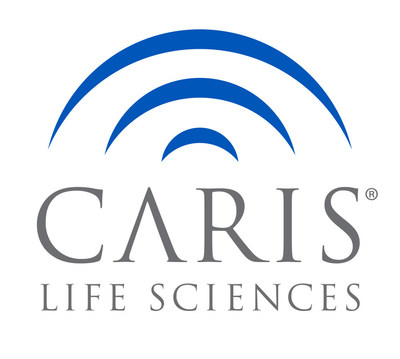The study demonstrates high concordance between next-generation sequencing-based MSI and immunohistochemistry-based MMR measurements across more than 190,000 patients
IRVING, Texas, Dec. 11, 2024 /PRNewswire/ -- Caris Life Sciences® (Caris), a leading next-generation AI TechBio company and precision medicine pioneer, today announced the publication of a large-scale study showing the critical role of next-generation sequencing (NGS) in assessing microsatellite instability (MSI) and, consequently, mismatch repair deficiency (dMMR) in solid tumors. High MSI (MSI-H) and dMMR are key biomarkers that help identify patients who may benefit from immune checkpoint inhibitor (ICI) therapies.
Published in JCO Precision Oncology, the study was performed by Caris in collaboration with leading cancer centers, including those within the Caris Precision Oncology Alliance™ (Caris POA). The results demonstrate high concordance between NGS assessment of MSI (NGS-MSI) and immunohistochemistry analysis of MMR (IHC-MMR) in over 190,000 solid tumors across a broad range of cancer types. Furthermore, the findings show that NGS offers valuable information on other actionable biomarkers beyond MMR status.
"Accurate MMR assessment is critical to ensure patients receive the most appropriate treatment, but there has been industry debate over the best method," said George W. Sledge, Jr., MD, EVP and Chief Medical Officer of Caris and study author. "Caris has addressed this question by leveraging its extensive clinico-genomic database and comprehensive molecular profiling expertise to demonstrate that NGS is not only a robust alternative to IHC-MMR but also offers additional advantages, such as the ability to identify other biomarkers critical for guiding therapy selection."
Defective MMR can lead to the accumulation of DNA errors, making the genome unstable and driving cancer development. IHC-MMR detects defective MMR proteins, while NGS-MSI measures MSI, the genomic result of dMMR. By directly comparing the concordance of NGS-MSI and IHC-MMR results in tumor samples tested by a single laboratory, Caris has provided the most comprehensive evidence to date supporting the non-inferiority of NGS-MSI to IHC-MMR in identifying dMMR-driven tumors. In the analysis of 191,767 solid tumors, only 0.31% discordance was observed between NGS-MSI and IHC-MMR, with no difference in overall survival between discordant tumors.
"Our study highlights the importance of NGS for comprehensive molecular profiling and its non-inferiority to IHC for identifying MMR-driven cancer," said Caris President and study author David Spetzler, MS, PhD, MBA. "NGS can detect dMMR cases that IHC misses, while IHC can identify some cases that NGS may not. Although neither technology can capture all dMMR cases, our findings show that NGS is a valuable tool for determining a patient's eligibility for not only ICIs but other targeted therapies as well."
The study also assessed the molecular characteristics, immunological landscape and clinical outcomes of the patients. As expected, dMMR/MSI-H tumors had better overall and post-immunotherapy survival compared to MMR-proficient/MSI-Stable tumors. Furthermore, analysis of NGS data showed that high tumor mutational burden, another biomarker for immunotherapy response, was more prevalent in dMMR/MSI-H tumors, supporting their eligibility for ICI therapy. These NGS-based findings provide valuable insights for personalized cancer therapy, especially in identifying high-risk patients who might benefit from immunotherapy based on their biomarker status.
Caris recently received approval from the U.S. Food and Drug Administration (FDA) for MI Cancer Seek™ as a companion diagnostic (CDx) to identify cancer patients who may benefit from treatment with targeted therapies. MI Cancer Seek is the first and only simultaneous whole exome sequencing (WES) and whole transcriptome sequencing (WTS)-based assay with FDA-approved CDx indications for molecular profiling of solid tumors. The assay includes one pan-cancer and five tumor-specific indications for numerous FDA-approved therapies, including pembrolizumab in MSI-H solid tumors and pembrolizumab plus lenvatinib in 'not MSI-H' endometrial carcinomas. MSI status is assessed by MI Cancer Seek using NGS-based WES. Optional add-on testing beyond MI Cancer Seek is also available, including IHC for more than fifteen tumor-specific proteins. IHC-MMR is offered for colorectal, endometrial, gastric, and uterine cancers.
About Caris Life Sciences
Caris Life Sciences® (Caris) is a leading next-generation AI TechBio company and precision medicine pioneer that is actively developing and delivering innovative solutions to revolutionize healthcare and improve the human condition. Through comprehensive molecular profiling (Whole Exome and Whole Transcriptome Sequencing) and the application of advanced AI and machine learning algorithms, Caris has created the large-scale, multimodal database and computing capability needed to analyze and unravel the molecular complexity of disease. This convergence of sequencing power, big data and AI technologies provides an unmatched platform to deliver the next generation of precision medicine tools for early detection, diagnosis, monitoring, therapy selection and drug development.
Caris was founded with a vision to realize the potential of precision medicine in order to improve the human condition, and we value our employees as much as we do our patients of every creed, color, sex, sexual orientation and religion. Headquartered in Irving, Texas, Caris has offices in Phoenix, New York, Cambridge (MA), Tokyo, Japan and Basel, Switzerland. Caris or its distributor partners provide services in the U.S., Europe, Asia and other international markets. To learn more, please visit CarisLifeSciences.com.
Caris Life Sciences Media:
Corporate Communications
CorpComm@CarisLS.com
214.294.5606
![]() View original content to download multimedia:https://www.prnewswire.com/news-releases/caris-life-sciences-publishes-large-scale-study-demonstrating-the-critical-role-of-next-generation-sequencing-in-microsatellite-instability-testing-302328295.html
View original content to download multimedia:https://www.prnewswire.com/news-releases/caris-life-sciences-publishes-large-scale-study-demonstrating-the-critical-role-of-next-generation-sequencing-in-microsatellite-instability-testing-302328295.html
SOURCE Caris Life Sciences






